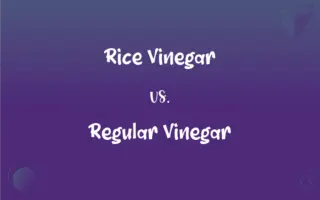Alive vs. Living: What's the Difference?
Edited by Aimie Carlson || By Janet White || Published on January 24, 2024
"Alive" means having life or being in a state of life, while "living" refers to the act or condition of a living organism or way of life.

Key Differences
"Alive" is used to describe something or someone that possesses life, typically in contrast to being dead. "Living," on the other hand, can refer to the act of leading a life, encompassing daily activities and experiences.
The word "alive" is often used in a biological context to signify biological functions or existence. In contrast, "living" can be used to describe a lifestyle or manner of conducting life, such as 'living well' or 'living in poverty'.
"Alive" is generally used as an adjective, as in 'The tree is still alive.' "Living," however, can function as an adjective ('living conditions') or a gerund (as in 'Living in this city is exciting').
In expressions, "alive" is often used to emphasize vitality or presence, like 'alive with excitement.' "Living" is used to denote ongoing processes or states, such as 'living traditions' or 'living expenses'.
"Alive" can also be used metaphorically to describe something as active or vibrant, whereas "living" is often used in a more literal sense, referring to the state of being alive or ways of life.
ADVERTISEMENT
Comparison Chart
Meaning
Having life, not dead.
The act or condition of a living organism.
Usage
Describes the state of possessing life.
Describes the process or manner of life.
Grammatical Function
Primarily an adjective.
Adjective and gerund.
Context
Biological existence, vitality.
Lifestyle, ongoing life processes.
Expressions
Used to emphasize presence or vibrancy.
Denotes ongoing states or practices.
ADVERTISEMENT
Alive and Living Definitions
Alive
Possessing life.
The flowers in the garden are still alive.
Living
Pertaining to a lifestyle.
They are accustomed to a frugal living.
Alive
Alert and active.
She felt alive after the morning run.
Living
Having life.
Trees are living organisms.
Alive
Surviving, especially after a threat.
He was alive after the accident.
Living
In use or practice.
English is a living language.
Alive
Still in existence or use.
Folk traditions are still alive in the village.
Living
Earning one's livelihood.
She makes a living as a writer.
Alive
Full of activity or animation.
The party was alive with music and dance.
Living
Relating to the current period.
He's the greatest living painter.
Alive
Having life; living.
Living
Possessing life
Famous living painters.
Transplanted living tissue.
Living
In active function or use
A living language.
FAQs
Is 'alive' used in daily conversation?
Yes, especially in biological or vibrant contexts.
Can 'alive' refer to inanimate objects?
Yes, metaphorically, to imply vibrancy.
What is the opposite of 'alive'?
Dead or lifeless.
What does 'alive' mean?
Having life or being in the state of life.
Is 'living' an adjective?
Yes, like 'living conditions'.
Can 'alive' be used figuratively?
Yes, like in 'alive with color'.
What does 'living' mean?
The act or condition of being alive; a way of life.
Is 'living' used in different contexts?
Yes, from biology to lifestyle.
Can 'living' be a noun?
Yes, as in 'earning a living'.
Can 'alive' be used in expressions?
Yes, like 'alive with energy'.
Can 'alive' describe feelings?
Yes, like feeling 'alive and excited'.
Is 'living' ever used metaphorically?
Less commonly than 'alive'.
Can 'alive' imply survival?
Yes, like being 'alive after an accident'.
Is 'living' used in legal terms?
Yes, like in 'living will'.
What is a 'living language'?
A language that is still in use and evolving.
How are 'alive' and 'living' different?
'Alive' is a state, 'living' is the process or manner.
Can 'alive' be used for plants?
Yes, to indicate they are not dead.
Is 'living' used to describe non-biological things?
Rarely, it's more for organisms or ways of life.
What does 'living proof' mean?
Evidence that is currently observable.
Does 'living' relate to quality of life?
Yes, it can describe conditions or standards of living.
About Author
Written by
Janet WhiteJanet White has been an esteemed writer and blogger for Difference Wiki. Holding a Master's degree in Science and Medical Journalism from the prestigious Boston University, she has consistently demonstrated her expertise and passion for her field. When she's not immersed in her work, Janet relishes her time exercising, delving into a good book, and cherishing moments with friends and family.
Edited by
Aimie CarlsonAimie Carlson, holding a master's degree in English literature, is a fervent English language enthusiast. She lends her writing talents to Difference Wiki, a prominent website that specializes in comparisons, offering readers insightful analyses that both captivate and inform.

































































